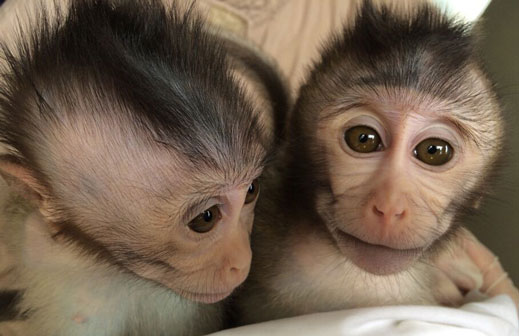Chinese scientists have brought monkeys with autism, and now they are being treated
Scientists in China have used genetic engineering to create monkeys with autism spectrum disorders. This achievement may simplify the task of testing new therapies, but it raises practical and ethical issues.

About one in 68 children in the United States suffers from autism. The number of children with this disease is growing by 13% every year according to the World Health Organization. Autism is not completely treated, but there are methods for correcting its symptoms: for example, a child with this disease can not only be taught to communicate in alternative ways, such as cards with images, but in the end, can be taught to speak, count, write and prepare for school. The correct and timely diagnosis is important, otherwise a person will need special care throughout life.
Long-term studies of mice with similar disorders have yielded little to solve this problem in humans. But in mice, in principle, the brain is different from the human one; they do not have a prefrontal cortex - an area of the brain where some of the human mental disorders are probably concentrated. Therefore, Chinese scientists switched to experiments on monkeys.
A team of scientists from the Shanghai Institute of Biological Sciences reported that they managed to breed more than a dozen monkeys with a genetic error, which causes a rare syndrome in children with symptoms in the form of mental retardation and autism spectrum disorders - repetition of words and limited interests. Monkeys exhibit psychiatric symptoms: they walk around the cell in circles, interact little with relatives - they behave very much like people with autism.
To achieve this result, scientists using the virus introduced copies of the human gene into the ovum of monkeys before they were fertilized. So the researchers copied Rett syndrome - when a girl is born with an excessive number of copies of the MECP2 gene.
The scientists’ next steps will be to study the monkey’s brain, test various methods such as brain stimulation, and try to reverse the genetic changes that caused the monkeys to get these symptoms. To do this, use genetic code editing technologies like CRISPR.
The study raises ethical questions: is a person entitled to do this with monkeys? However, similar studies have already been conducted in China, Japan, and the United States - monkeys with genetic errors causing psychiatric problems, including schizophrenia, were brought in laboratories.

About one in 68 children in the United States suffers from autism. The number of children with this disease is growing by 13% every year according to the World Health Organization. Autism is not completely treated, but there are methods for correcting its symptoms: for example, a child with this disease can not only be taught to communicate in alternative ways, such as cards with images, but in the end, can be taught to speak, count, write and prepare for school. The correct and timely diagnosis is important, otherwise a person will need special care throughout life.
Long-term studies of mice with similar disorders have yielded little to solve this problem in humans. But in mice, in principle, the brain is different from the human one; they do not have a prefrontal cortex - an area of the brain where some of the human mental disorders are probably concentrated. Therefore, Chinese scientists switched to experiments on monkeys.
A team of scientists from the Shanghai Institute of Biological Sciences reported that they managed to breed more than a dozen monkeys with a genetic error, which causes a rare syndrome in children with symptoms in the form of mental retardation and autism spectrum disorders - repetition of words and limited interests. Monkeys exhibit psychiatric symptoms: they walk around the cell in circles, interact little with relatives - they behave very much like people with autism.
To achieve this result, scientists using the virus introduced copies of the human gene into the ovum of monkeys before they were fertilized. So the researchers copied Rett syndrome - when a girl is born with an excessive number of copies of the MECP2 gene.
The scientists’ next steps will be to study the monkey’s brain, test various methods such as brain stimulation, and try to reverse the genetic changes that caused the monkeys to get these symptoms. To do this, use genetic code editing technologies like CRISPR.
The study raises ethical questions: is a person entitled to do this with monkeys? However, similar studies have already been conducted in China, Japan, and the United States - monkeys with genetic errors causing psychiatric problems, including schizophrenia, were brought in laboratories.
Only registered users can participate in the survey. Please come in.
Is it normal to conduct such experiments on monkeys?
- 92.7% Yes, of course, all means are good for finding methods of treatment 485
- 7.2% No, people take too much on themselves 38
